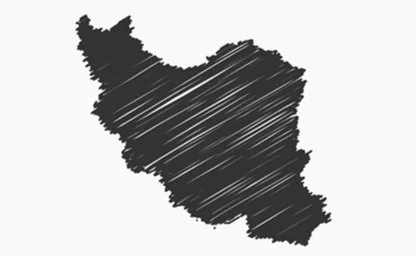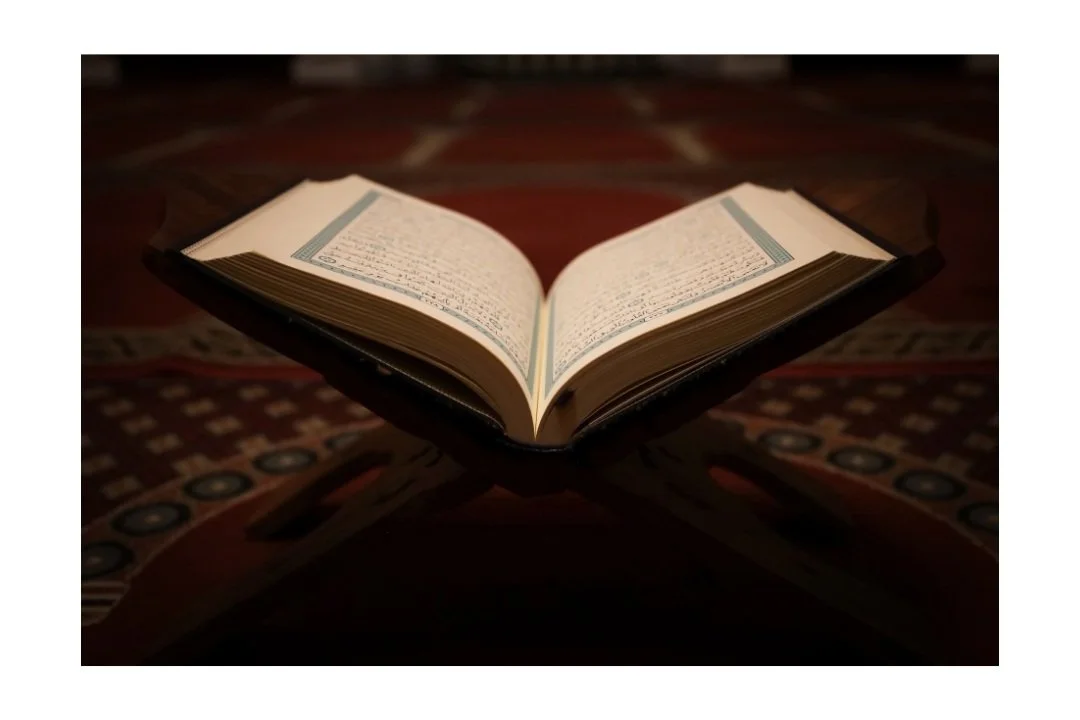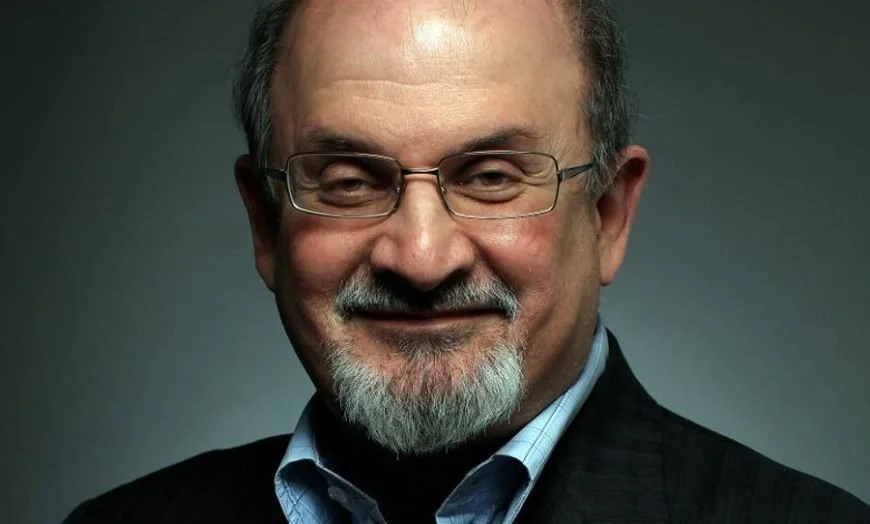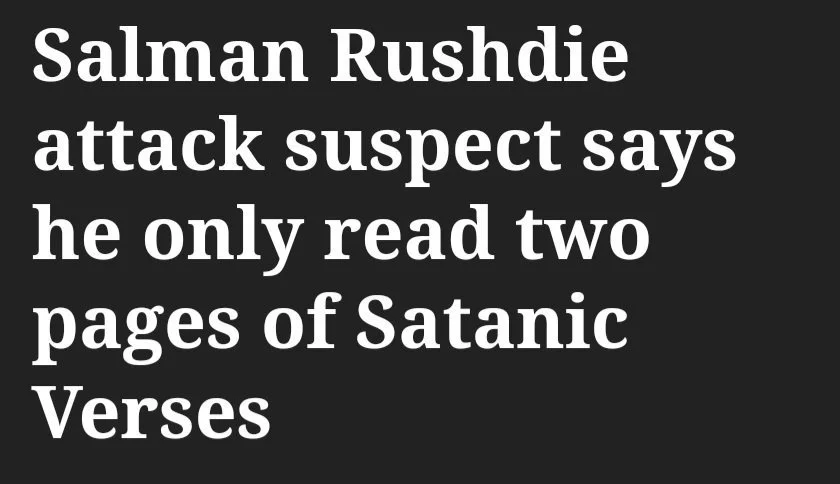The Salman Rushdie Stabbing: Has Anyone Read 'The Satanic Verses’?
Image source: Reuters
Histrionic Islamists declared a fatwa on Rushdie back in 1989 when simply roasting him would’ve sufficed.
So for historical context, because context matters, Iran had undergone a revolution a decade earlier, aptly known around the world as the Iranian Revolution. A major motivational factor that effectuated the emergence of an Islamic republic and overthrow of the Western-backed Shah Reza Pahlavi, who, incidentally, was installed as iron-fisted puppet-leader after CIA and British agents ousted the democratically elected Mohammad Mosaddegh in 1953 — because Iranian’s stupidly voted for the wrong guy that would’ve prevented Western powers from controlling the natural resources in the country (oil) — was collective resentment towards Western influence on the country.
Not unlike what happened in Cuba in the 1950s. Except for the communism part, armed uprising, and Fidel Castro deviating the country from religion, declaring it an atheist state after the communist regime overthrew US-backed dictator Fulgencio Batista.
Iran.
Anti-Western sentiment was inevitable, especially in a society like Iran, known for its strong culture, traditions, and scholarly standards. So Iranians being punished by America in the form of various sanctions since 1979, as retaliation for choosing sovereignty over enslavement, could only intensify rancor amongst many Iranians. Not least of all Ayatollah Khomeini, former supreme leader of Iran.
So, now that I got a little necessary history out of the way, because it’s important to understand why people behave the way they do, and Salman Rushdie was physically attacked on stage a few days ago, it leads us to the question: did Ayatollah Khomeini ever read The Satanic Verses upon its publication in 1988?
No one knows. But I think we can deduce, by simple observation of a person’s reaction to something, whether they have fully informed themselves about it, or are acting on sheer ignorance. And ignorance breeds arrogance.
Misinterpreting something on purpose so it’ll give you an opportunity to act on your emotional and violent urges is churlish asshole behavior. Extremists should know better considering the Quran itself is a difficult book to understand, and is constantly being misinterpreted by other extremists equally lacking in critical thinking skills.
The Quran
Freedom of speech, or expression, has its limits. There are no absolute freedoms in the world — this is a fact. Back in the early ‘80s musicians Brian Eno and David Byrne featured the song "Quran" on their album, My Life In the Bush of Ghosts. The song sampled Algerian Muslims chanting verses from the holy book over a funk-like beat that blended "African and Middle Eastern rhythms, and electronic music techniques," to borrow from the song’s Wikipedia page.
“Quran” is considered a gem to many, due to its innovative contribution to the music world, though simultaneously exudes underlying tones of cultural appropriation, and back in the 1980s at that. But due to backlash from Muslim groups claiming that verses from the Quran shouldn't be used in music, and the song was thus deemed an offense to Islam, "Quran" was removed from later re-releases of the album. Is is offensive? I don’t know. That’s for you to decide. If it is, then don’t listen to the song ever again.
Byrne said in an interview about the decision to self-censor:
“There was an op-ed piece in The New York Times by an evolutionary biologist or somebody - which was a curious place for the opinion to come from - and he said that there's no such thing as a completely free, uncensored medium, that people censor themselves all the time, in deference to hurting other people’s feelings, or offending other groups, or in their own, not to provoke a fight. It is a form of censorship, but that’s also the way people are as animals - that you don’t unnecessarily provoke people unless you really are looking for a fight. And we thought, "Okay, in deference to somebody's religion, we'll take it off. And you do self-censor certain things, and it's not necessarily a bad thing. That’s just the way human social interaction works."
Many fans of Eno and Byrne disagreed with their choice to self-censor, though self-censorship has always been part of the human experience. There are certain things that we have the common sense, and decency, to not say or do in daily interactions. And there are Cluster B types who think in terms of “but I’m so great and my brilliance should not be unseen and unappreciated by the masses!”
The world doesn’t need more of them, but there is room for those who push the envelope responsibly. Allowing for sacred spaces to exist and within them, new and difficult questions, ideas, and truths that are vital for minds to evolve will produce more well-adjusted people in the 21st century, instead of fostering overly-defensive reactions to anything that challenges your own beliefs and seeing them as attacks on your collective identity.
Being able to not impose your false sense of superiority on others requires some self-control, as Charlie Hebdo provocateur-satirists in France and their supporters, for instance, zealously demonstrated not to have.
Why re-publish cartoons of the Prophet Muhammad, with the full knowledge that depicting the Prophet is considered blasphemous to Muslims, the more powerless of which your governments are bombing in mass murder Imperialist crusades masquerading as "democracy and freedom" campaigns so Western/European populations can profit from the natural resources stolen from the Middle East? Because you have a satanic need to dehumanize others and watch them suffer is why.
Poking at and provoking a group whose nations you're already terrorizing, smearing, bombing, and destroying is sadism through and through. It reveals a smug, insolent, wicked need to reinforce your extremist ideas of supremacy and freedom of speech, and is a testament to the fact that freedom of speech or expression is poorly understood by infantile, mentally unwell types who think in absolutes and disregard the responsibility that comes with having freedom.
Maybe Khomeini did read the novel, though it seems unlikely, considering he had been a student of Ancient Greek philosophy with a particular admiration for Aristotle (the founder of formal logic), was a literary enthusiast, poet, Shia scholar, teacher, theorist, the highest religious authority in Iran, and the author of 40 books.
I’m gonna assume that Khomeini was no idiot.
He was, however, emotional. A lot of people are, but you can’t be a writer and poet and not be an emotional person to some degree. You’d have to not only recognize the power and complexity of words and how they are used to express ideas and meaning but also know how to form an unemotional, reasoned response to words, especially ones you don’t agree with. You can’t be spineless, but hard-hitting. Khomeini had to have known this.
He succinctly referred to the US as “The Great Satan” as only a poet could. And Khomeini’s reaction to Salman Rushdie’s controversial novel was emotional, perhaps to rile up other emotional Muslims across the globe, to the extent that it crossed a line into extremism.
This is the result of emotional, extremist types, who, unquestionably, have underlying, unaddressed mental health issues:
Declaring a fatwa against a fellow writer because he inventively used features of Islam to illustrate themes of identity, disillusionment, migration, and alienation among others, in a story about the bicultural experience is odd, given Khomeini’s learned background. But knowledge has its limits for everyone. No one knows everything. Khomeini couldn’t possibly know — truly know — the complexity and despair and heartache and challenges and mental turmoil of many people who are made to straddle two vastly different cultures, or molded into lost, incomplete individuals by different values and societies from a young age.
It’s possible that Khomeini did read the novel in private, and didn’t understand it. Maybe it was a bad translation. Doubtful, but not impossible, for the reasons stated above. Didn’t want to understand it seems more feasible. It’s like when someone is insolently dismissive of you and you immediately catch a whiff of insecurity wafting through the air.
Maybe power and popularity got to his head. Maybe it’s the case of people having a tendency to castigate their own more severely, in this case, fellow Muslims, for achieving the freedom to be their own person, for representing something that they are opposed to, and being daring and smug about it. Rushdie has that perpetually smug look about him that could also be an exacerbating factor, or even real reason Khomeini called for his death. Just speculating. No one knows.
Salman Rushdie
But whether or not it was Rushdie’s novel or his face, calling for his death was out of line. Khomeini and friends could’ve just called The Satanic Verses “boring as fuck” in a sophisticated literary review. Or roasted Rushdie for being a poor man’s Gabriel Garcia Márquez. Because if you really want to hurt an author, just trash their work. Reacting with intellectual vigor, as Khomeini should’ve done, should’ve been expected by the Muslim community, being an intellectual himself. It would’ve generated more Khomeini fans, I think. More importantly, it wouldn’t have drawn more attention to a book extremists wanted to destroy, and catapulted a despised author into worldwide prominence as a result.
The whole situation is shrouded in irony.
Source: The Independent
We don’t know if Khomeini ever read The Satanic Verses, but we know that Rushdie’s young, impressionable attacker, Hadi Mattar of New Jersey — who’s possibly struggling with an identity crisis like a lot of people of ethnic backgrounds who feel lost in the West do — admitted to reading only 2 pages of the novel.
What’s most evident of all is that some folks get angry when you have the courage and freedom to put a new thought or concept or perspective out into the world that provokes critical thinking, and rouses people to open their minds to a person’s attempt to communicate a different life experience. Not everyone’s going to like what you say, but what’s as equally tedious as easily offended types are wimpish do-gooders, also known as people pleasers.
The modern world is a hotbed for extremists, which shouldn’t be surprising to anyone who’s paying attention. With aggressive Western influence reaching all corners of the globe, some people are going to see that as a threat, in the same way many Americans were hysterical about Muslims invading the US with their weird practices after 9/11. It triggers an extreme reaction because you feel that you are up against an extreme opponent — and the US is an extreme opponent. So extremists, on whicever side, resort to violence, death threats, intimidation, harassment, and all around thuggish behavior, akin to the workings of an organized crime gang when they don’t get their way, and to keep their “own” in line. It’s fucked up when you think about it.
Who are the ones insulting Islam here really?








